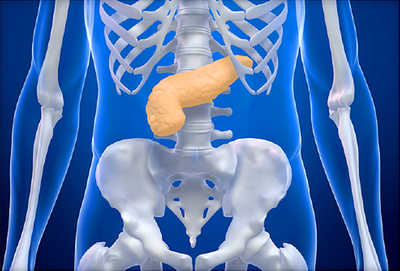What organ produces insulin?
The natural hormone insulin is produced in the beta cells of an organ known as the pancreas. The pancreas is located in the abdomen behind the lower part of the stomach. It measures about 6 inches long and extends horizontally across the abdomen. The beta cells are located in an area of pancreas known as the pancreatic islets, and are the cells responsible for producing, storing and releasing the hormone called insulin. Insulin is the hormone responsible for regulating blood sugar levels. The pancreas is unique in the sense that it is both an exocrine and endocrine gland. This organ is part of the digestive system and is responsible for producing hormones and enzymes that aid in the break down of food.
The primary hormones that are produced by the pancreas include:
- Insulin – this hormone works by allowing the body’s cells to absorb glucose from the bloodstream and use it as energy. This in turn helps to reduce high blood sugar levels.
- Gastrin – gastrin hormone stimulates specific cells in the stomach that aids in digestion.
- Glucagon – this hormone helps insulin to maintain a normal blood sugar level by stimulating the cells to release glucose when it is too low.
- Vasoactive intestinal peptide – vasoactive intestinal peptide helps to control absorption and secretion of water from the intestines.
- Somatostatin – in case other hormones such as glucagon and insulin are too high, the hormone somatostatin will be released to help maintain blood sugar.
What is the function of the pancreas?
A pancreas that is functioning normally produces chemicals which are responsible for digesting food that we eat. The pancreas plays a role in two different systems, that is the exocrine system and the endocrine system. The exocrine tissue in the pancreas secretes an alkaline fluid that consists of several enzymes. These enzymes work by breaking down the food we eat into small particles that can be absorbed by the intestines.
The enzymes include:
- Lipase – this enzyme helps in breaking down fats into cholesterol and fatty acids.
- Amylase – this enzyme is responsible for breaking down carbohydrates.
- Chymotrypsin and Trypsin – these enzymes aid in digesting proteins.
The endocrine system consists of organs that produce chemicals and hormones that are let into the blood to regulate metabolism, growth and reproduction. The pancreatic islets secrete insulin, in addition to other hormones. In case there is a rise in blood sugar levels, the beta cells in the pancreas will secrete the hormone insulin. This hormone works by converting glucose from the bloodstream into energy that muscle cells can use or store for energy. In addition, insulin helps the liver to absorb sugar and store it in the form of glycogen for future use. In case there is a drop in blood sugar because of skipping meals, the alpha cells in the pancreas will release glucagon hormone. This hormone will then cause glycogen stored in the liver to be broken down into glucose. Glucose will then be released into the blood, which helps to restore blood sugar levels to a normal range.
Problems with the pancreas
If there is a problem with the pancreas, it can affect the entire body. This can affect the amount of digestive enzymes that are produced by the pancreas. In case there is not enough digestive enzymes being produced, food will not be properly absorbed. This may lead to health complications such as diarrhea and weight loss. The pancreatic islets are responsible for producing the hormone insulin. People with type 1 diabetes do not produce any insulin. This is because the insulin producing beta cells are mistakenly attacked by the immune system. When we eat carbohydrates, the amount of glucose in the bloodstream tends to rise. Glucose is a form of sugar which is one of the biggest sources of fuel for the body.
An increase in blood sugar will stimulate the pancreas to release the hormone insulin, which helps to regulate blood sugar levels. As a result of beta cells dying, the pancreas in people with type 1 diabetes will struggle to secrete enough insulin. This leads to a build up of blood sugar levels which, if not treated, can lead to serious health problems like nerve and kidney damage. To prevent this risk, people with type 1 diabetes require insulin injections to keep their blood sugar levels normal.
People with type 2 diabetes cannot produce enough insulin, or use it properly. This is known as insulin resistance and the pancreas needs to produce more insulin than it normally does to control blood sugar levels. If the pancreas cannot keep up with the demand for insulin, diabetes symptoms may start to show.
Diabetes symptoms include
- frequent urination
- feeling thirsty
- extreme thirst
- blurred vision
- weight loss
- fatigue
- tingling of hands and feet
If you notice any of these symptoms, visit your doctor.
—
Disclaimer: Please note that the contents of this community article are strictly for informational purposes and should not be considered as medical advice. This article, and other community articles, are not written or reviewed for medical validity by Canadian Insulin or its staff. All views and opinions expressed by the contributing authors are not endorsed by Canadian Insulin. Always consult a medical professional for medical advice, diagnosis, and treatment.


